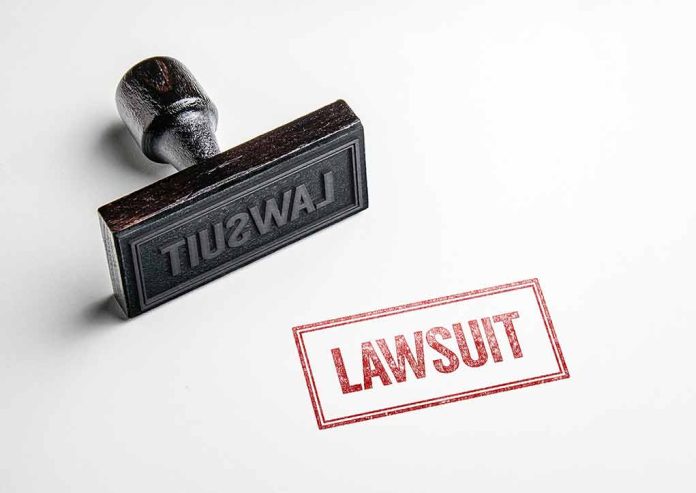
Blackfeet Nation members take legal action against Trump administration tariffs, challenging presidential authority and citing violations of tribal treaty rights established over two centuries ago.
Key Takeaways
- Two Blackfeet Nation citizens filed a federal lawsuit challenging the constitutionality of Trump’s tariffs on Canada.
- The plaintiffs argue the tariffs violate both the U.S. Constitution and the Jay Treaty of 1794, which guarantees Native Americans duty-free border crossing rights.
- The lawsuit challenges the president’s authority to impose tariffs, claiming this power belongs solely to Congress.
- The case questions whether the International Emergency Economic Powers Act authorizes presidential tariff imposition.
Constitutional Challenge to Presidential Tariff Authority
Two members of the Blackfeet Nation have initiated a significant legal challenge against the Trump administration’s tariffs on Canadian goods. State Senator Susan Webber and rancher Jonathan St. Goddard filed the lawsuit in federal court, represented by attorney Monica Tranel. Their complaint directly questions the president’s constitutional authority to impose tariffs, arguing that this power is explicitly granted to Congress under Article I of the Constitution, which gives the legislative branch the exclusive right to regulate commerce with foreign nations.
The lawsuit specifically targets several Executive Orders and presidential proclamations that established tariffs on Canadian goods, including those related to steel and aluminum imports. The plaintiffs argue these orders exceed presidential authority by usurping congressional power. This case joins other legal challenges to the administration’s tariff policies but brings a unique perspective through its focus on Native American treaty rights and the specific impacts on tribal communities along the northern border.
Blackfeet tribal members are suing the federal government, saying that Trump's tariffs on Canada violate the Constitution and tribal treaty rights. It's the latest example of tribes flexing their sovereign status to oppose new federal policy. https://t.co/TqFb131gLP
— UAINE (@mahtowin1) April 8, 2025
Treaty Rights and Tribal Sovereignty
A central argument in the lawsuit involves the Jay Treaty of 1794, which established rights for indigenous peoples to cross the U.S.-Canada border freely without paying duties on goods. The plaintiffs contend that Trump’s tariffs directly violate these long-established treaty rights, which have particular significance for the Blackfeet Nation whose traditional territory spans both sides of the current international border. The treaty recognizes the special relationship between tribal nations and the U.S. government, establishing rights that predate modern border restrictions.
The Blackfeet reservation is located in northern Montana, directly adjacent to the Canadian border. This geographic position makes cross-border commerce particularly important to tribal members, who have historically maintained cultural and economic ties with indigenous communities in Canada. The plaintiffs argue the tariffs create an undue hardship on tribal members who depend on cross-border trade and movement, effectively undermining rights guaranteed through treaties that remain legally binding.
Emergency Powers and Executive Authority
The lawsuit specifically challenges the administration’s use of the International Emergency Economic Powers Act (IEEPA) as justification for imposing tariffs. The plaintiffs contend that while this law grants the president certain authorities during declared emergencies, it does not extend to imposing tariffs, which remains a congressional power. They further argue that the administration’s declarations of national emergencies related to drug trafficking and border security don’t justify broad tariff measures against a close ally.
In addition to constitutional concerns, the complaint characterizes the tariffs as “unconstitutionally vague” in violation of due process rights. The plaintiffs are seeking judicial intervention to either prohibit the implementation of these tariffs entirely or, at minimum, exempt tribal members from their application. Their requested relief aligns with both constitutional principles regarding separation of powers and the specific treaty rights of Native American tribes recognized in the Jay Treaty.
Broader Implications for Executive Power
This case represents more than just a dispute over trade policy; it addresses fundamental questions about the limits of executive authority. Legal analysts suggest the lawsuit could potentially invoke the “major questions doctrine,” which holds that for decisions of vast economic and political significance, executive agencies must point to clear congressional authorization. The outcome could establish important precedent regarding presidential power to enact tariffs without explicit congressional approval.
While narrower in scope than other pending legal challenges to the administration’s “Liberation Day” tariffs, this case shares core arguments about executive overreach. The plaintiffs’ emphasis on tribal sovereignty adds an additional dimension to the constitutional debate, highlighting tensions between contemporary trade policies and historical treaty obligations. The case underscores how tariff policies can have outsized impacts on communities with unique legal relationships to the federal government.
Sources:
Blackfeet Tribal Members Sue Feds Over Canada Tariffs
Blackfeet tribal members sue to stop Trump tariffs against Canada
Blackfeet Nation Indians File Lawsuit Challenging Trump’s Canada Tariffs



